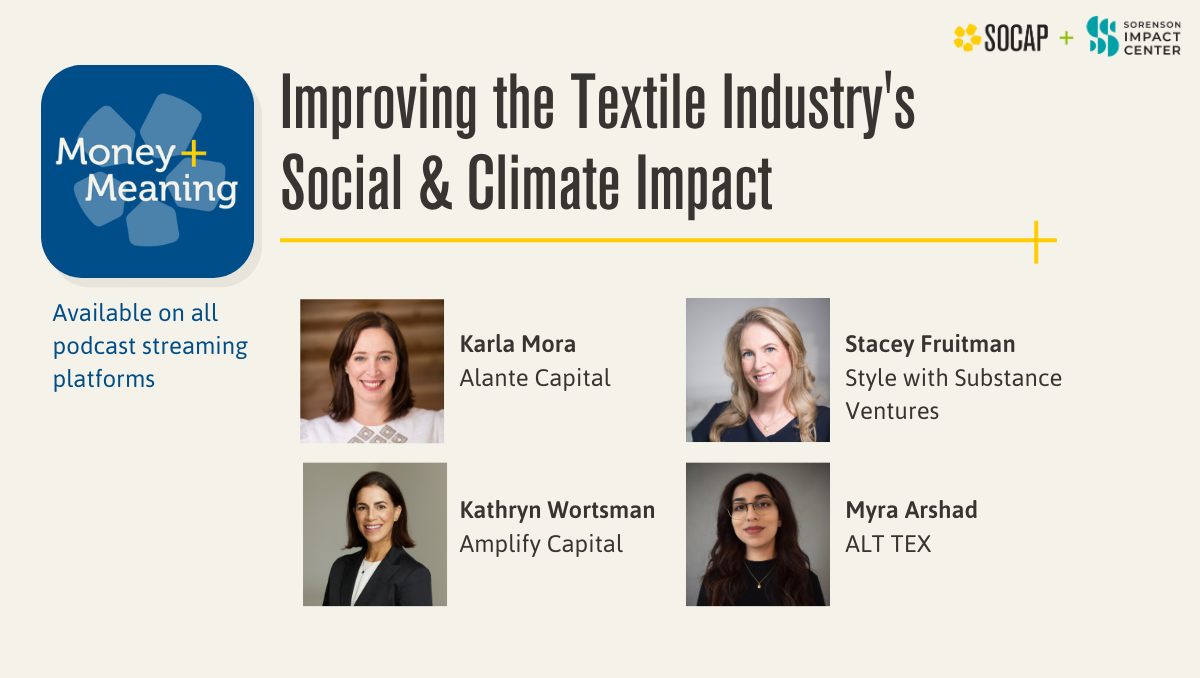“We really looked at it from this global economic perspective of this is an industry in need — let’s make sure the need can be done in the right way. It’s an opportunity for transformative change.” — Karla Mora of Alante Capital
Entrepreneurs and investors are partnering to help improve the textile industry’s social and climate impact. With innovative materials and operational changes for efficiency and transparency, they are taking aim at the 1.2 billion tons of CO2 produced annually during textile creation.
A new Money + Meaning episode features a SOCAP22 discussion with fashion leaders and funders who are seizing the opportunity to reshape material, supply chain, and consumer systems for greater circularity in textiles. By funding and creating projects to close the fashion ecosystem loop, they are moving forward on a path to decarbonization and realizing new opportunities along the value chain.
Discussion moderator Kathryn Wortsman, Managing Partner at Amplify Capital, outlined the scope of the textile industry’s environmental footprint. “It’s hard to tackle climate and decarbonization without bringing textiles into the equation,” she said. Due to the use of toxic chemicals and metals, the textile industry contributes to 20% of global water pollution. Overproduction and overconsumption come at a climate cost as well, she said, as nearly 75% of textiles end up in landfills or are incinerated.
By viewing these as opportunities rather than insurmountable problems, Wortsman and the team at Amplify Capital seek partnerships with entrepreneurs who are creating technology-driven solutions for impact in the climate, health, and education sectors. She pointed to ALT TEX as an example of an innovative company creating a sustainable product at a similar cost to what’s on the market today. “That made ALT TEX investable,” she said.
ALT TEX, a Toronto-based startup, uses food waste to create a biodegradable alternative to polyester. CEO Myra Arshad said the company’s goal is to get at the root of problems in the fashion industry. “One of the pillars of the issue with lack of sustainability in fashion is synthetics,” she said. “We need to re-create with equal performance in a more sustainable way.”
By engineering biodegradable polymers, ALT TEX uses synthetic biology to create a textile that can match the scale and performance of polyesters. More importantly, she said, it can “plug into polyester’s existing supply chain,” which means existing manufacturing equipment doesn’t need to be updated or replaced — an immediate cost benefit.
The combination of cost parity and sustainability is a focus for funders like Karla Mora, Founder and Managing Partner at Alante Capital. The venture capital fund invests in technologies to advance a circular and sustainable future for the textile industry. She launched the fund in 2016 after seeing leaders in the apparel industry partnering more with sustainable startups. “They had huge power to resist change. So if they were looking for change, that was a monumental shift,” she said. “I wanted to ensure the innovation we were bringing could have an intersection between sustainability and profitability. That was the ignition point for me.”
In addition to facing the effects of the climate crisis that threaten crops such as cotton, the fashion industry could soon be subject to regulations and potential fines in government legislation for pollution caused by microfibers. “Now they’re looking for biodegradable alternatives to synthetic fibers,” she said. “There’s a huge demand to be innovative … (and) tie innovation to sustainability.”
Supporting change in the fashion ecosystem through investments is also the goal at Style with Substance Ventures. Since 2017, Founder Stacey Fruitman has partnered with innovators, technologies, and brands working to reduce the impact of the fashion industry. “I’ve seen a tremendous change over the past number of years,” she said. “More funds are open to investing; there certainly are a lot more new, innovative companies.”
As the technology for sustainable fashion grows more sophisticated, it is attracting climate tech investors and reducing financial risk for Fruitman and others. “There’s a tremendous amount of investment and research in recycling technology,” she said. “Material science is very exciting.”
Listen to the full conversation on Improving the Textile Industry’s Social and Climate Impact
Don’t miss out! Subscribe to Money + Meaning on Apple Podcasts, Stitcher, TuneIn, Spotify, or anywhere else you find podcasts.
Listen to more episodes of Money + Meaning here.
Money + Meaning is the official podcast of SOCAP. The series aims to expand the conversation around impact investing and strategies to finance and support social change while stimulating innovative and valuable new partnerships across sectors.






